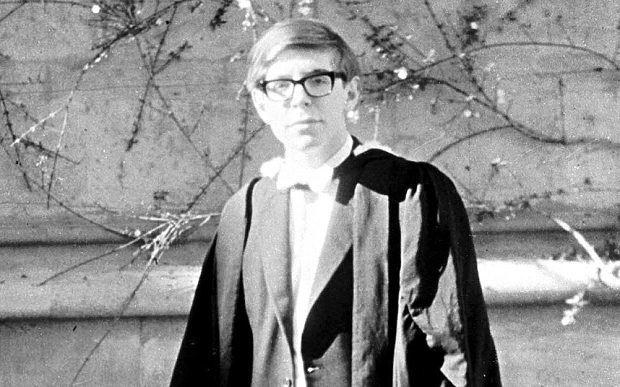With a heavy workload, financial stress, and balancing a social life, college can at times seem like a drag. Is the stress and hard work of all of this in college really worth the piece of paper at the end of these four or possibly six or eight years of toil? Just as millions of college students have experienced, renowned physicist Stephen Hawking also struggled to find meaning in his education. It is hard to believe that someone that is largely considered one of the greatest thinkers of modern times could possibly think this of his college years. When your life is put on a timer, school is the last of your priorities.

At only seventeen years old, Stephen Hawking entered the prestigious Oxford University and wanted to study physics and math, but to keep his father happy he ended up studying physics with chemistry rather than mathematics. During his first year, Hawking battled with feelings of isolation, as he did not make many friends, as his classmates were much older than he was.1 He thrived but was not very happy most of the time he was there. Loneliness is a very common thing for college students to go through, as for many, it is the first time away from home. Frankly, adjusting can be difficult, but more so at such a competitive school like Oxford.
However, things began to look up for the future scientist as, during his last year an an undergraduate, he joined the rowing club and went to parties with this friends.2 With his undergraduate degree in the books, Hawking turned his focus on cosmology, a sub-section of astronomy that is dedicated to discovering the origins of our universe. When he began his graduate career in the mid-sixties, Hawking slowly began to lose control of his body. For some reason, he was getting clumsier and clumsier, and fell for no reason at all.3
After a visit with a specialist, Hawking was diagnosed with amyotrophic lateral sclerosis, otherwise known as ALS or Lou Gehrig’s disease. The disease slowly breaks down the tissue in the nervous system that affects movement.4 While brain function was not affected at all, Hawking slowly but surely would lose control of his body until he died. After his diagnosis, he was only given two-and-a-half years to live.5 His new-found academic happiness was short-lived as he was now living only to die. His years as an undergraduate were now seemingly wasted, as he could not finish his PhD at his new school Cambridge in the limited amount of time he had left.

While initially depressed, a series of events led Hawking to use his limited time wisely. First, while in the hospital, he saw a young boy across from him die from leukemia, which made him realize that while he may have it bad, others have it a lot worse.6 Secondly, he had a dream that he was going to be executed, and he came to the realization that, while he was initially bored with life, there was still a lot left that he wanted to do.7 Lastly and most importantly, he became engaged to his first wife, Jane Wilde. Reflecting back on her significance, Hawking said, “the engagement changed my life. It gave me something to live for. It made me determined to live. Without the help that Jane has given I would not have been able to carry on, nor would I have had the will to do so.”8 Cambridge wanted to help Hawking continue his work, and while they could not make the exception of letting him get his PhD early, they helped in the quality of his life by helping him find closer housing, since Hawking could no longer walk far.9
His disease developed much slower than expected, and with everything falling into place for Hawking, he began making his landmark discoveries in the fields of cosmology and astrophysics. He suggested that the universe must start at a singularity (a point in time where the matter in the universe is infinitely dense) and from then on explodes with a “big bang.”10 Backed by Einstein’s theory of general relativity, it was very difficult to argue with the math behind the landmark theory.

A major part of Hawking’s life was that he wanted to make physics accessible to the everyday person. With this in mind, he wrote books such A Brief History of Time and Black Holes and Baby Universes, as well as help write and produce science movies such as The Theory of Everything. He also refused to let his disability stop him from doing whatever he tried, and to live as normal a life as possible, and take as many opportunities as he could.11 Sadly, we lost a great mind as he passed away on March 14, 2018, which just so happened to coincide with Einstein’s birthday. Hawking defied odds throughout his career as he outlived his initial “death sentence” by more than fifty years. While he can no longer provide further discoveries, he has brought inspiration to a new generation of physicists. Many look up to Newton and Einstein and say they want to be like them, but now many look up to Hawking and say the same.
- Major 21st-Century Writers, 2005, s.v. “Hawking, Stephen W(illiams) (1942-).” ↵
- Major 21st-Century Writers, 2005, s.v. “Hawking, Stephen W(illiams) (1942-).” ↵
- Major 21st-Century Writers, 2005, s.v. “Hawking, Stephen W(illiams) (1942-).” ↵
- L. Fleming Fallon Jr, An Overview of Lou Gehrig’s Disease (ALS), in Lou Gehrig’s Disease, edited by Sylvian Engdahl (Detroit: Greenhaven Press, 2012), 16-24. ↵
- Major 21st-Century Writers, 2005, s.v. “Hawking, Stephen W(illiams) (1942-).” ↵
- Stephen Hawking, A World Famous Scientist Tells about His Life With ALS, in Lou Gehrig’s Disease (Detroit: Greenhaven Press, 2012), 101. ↵
- Stephen Hawking, A World Famous Scientist Tells about His Life With ALS, in Lou Gehrig’s Disease (Detroit: Greenhaven Press, 2012), 101. ↵
- Major 21st-Century Writers, 2005, s.v. “Hawking, Stephen W(illiams) (1942-).” ↵
- Stephen Hawking, A World Famous Scientist Tells about His Life With ALS, in Lou Gehrig’s Disease (Detroit: Greenhaven Press, 2012), 103. ↵
- UXL Encyclopedia of World Biography, 2003, s.v. “Hawking, Stephen,” by Laura B. Tyle. ↵
- Stephen Hawking, A World Famous Scientist Tells about His Life With ALS, in Lou Gehrig’s Disease (Detroit: Greenhaven Press, 2012), 100. ↵



63 comments
Daniela Martinez
This article depicts the story of Stephen Hawking in a way that is both relatable and inspirational. The article has a clear flow that allows readers to understand the different aspects of Hawking’s life. Hawking defied odds during his career and was able to have a successful career in the field he loved. His persistence and bright mind are highlighted in this article and serve as an inspiration to the world. It is a shame that a bright mind was lost, however, Hawking’s impact on the science world will continue to live on. Overall the article was very interesting and informative.
Tyanne Pearcy
Stephen Hawking will forever be an inspiration to me and most. This article does a great job of explaining his story in a more condensed form. The start of the article really helps college students like me connect with him on another level. To suffer such a life changing condition and accomplish the incredible things he has done for science is outstanding. In addition, having his love interest, Jane Wilde by his side through all his challenges was such a genuine and refreshing look on one reason why Hawking continued to want to live. His story really makes you want to appreciate life no matter how it comes at you.
Bictor Martinez
Stephen Hawking is truly an inspiration. I have heard of him a couple of times, but never his life story and this article helps explain just that. Being diagnosed with the disease he had, he helped me believe that all you need in life is your brain to be happy. He overcame odds that were against him, in which doctors all saying that he will die soon. Despite his disease, he still was able to live a normal life and do things he wished to accomplish. This shows that no matter in what state of health you may be, do not let it lead the way for your future.
Sienna Guerra
I was really interested in reading this article since in one of my classes this semester, the name of Stephen Hawking was brought up in the book and I had not known his background until now. I am amazed at how his disabilities of ALS which effects his nervous system! Knowing that he is a scientist and needs his brain to conquer the discoveries and research needed is inspiring.
Nathalie Herrera
The beginning paragraph can feel very relatable to many university students. This is interesting because in some way we can all relate to one greatest minds in the world, Stephen Hawking. His story is one to tell and remember. He gave and still gives inspiration to many, and this will spark new great minds to the discovery of new great things. I think an important lesson to remember that was talked about within this article is to never give up hope on yourself despite the unfortunate situations you were put upon. Hawking still kept learning and theorizing, he never let his disability stop him from being who he truly was.
Alexander Manibusan
I’m very proud of Stephen Hawking for overcoming his struggles. While I have heard the “horror” stories of college, I now find inspiration in Hawking. I find it amazing how he worked alongside with so many people like Michio Kaku and Neil Degrasse Tyson and how he is compared to Einstein. I find it a bit sad that he never discovered some of the secrets of the universe (such as the “theory of everything”). But I am grateful for his work on black holes and how the early stages of the universe looked like. What an extraordinary man.
Jose Fernandez
Dr. Hawking’s life is an inspiration. This article is very well written and presents important facts about Hawking’s life and career. It is incredible how someone with such limitations achieved so much. Even though I already knew a lot of stuff about Stephen Hawking’s life, I learned many things by reading this article. I really admire Dr. Hawking and I think he serves as a role model for anyone who thinks that they are limited by a disease. He had a great mind and a greater spirit.
Robert Freise
This article about the life of Stephen Hawking, gave me inspiration. Despite the obstacles of loneliness and the terrible nervous system disease of ALS, He still overcame the odds and lived a successful life. This article gave me more knowledge about Hawking’s life, it gave me the knowledge of the books he created throughout it. Its amazing through the advancement of technology that hawking was ab,e to inspire so many people throughout the globe despite his disease. Great article!!
Honoka Sasahara
This article made me think that we can live hopefully even if with knowing that only a few time left. To never give up doing what we want to do and to love someone will be our power.
I guess he was succeed to notice that which leads to his great achievement and the rest of life filled with happiness.
Harashang Gajjar
This battle of appearance over reality gets to the heart of the confusion over who Stephen Hawking is and how to be explained. Long since founding forefather of acceptable disability, it is in fact his bright mind that gave him extraordinary mind, way before he had motor neurone disease. By failing to recognise that Hawking’s success had nothing to do with disability, we give the disease unreasonable credit for his perfectly able mind with outstanding scientific achievements. Stephen Hawking would not be Stephen Hawking if he had been born with his disability.